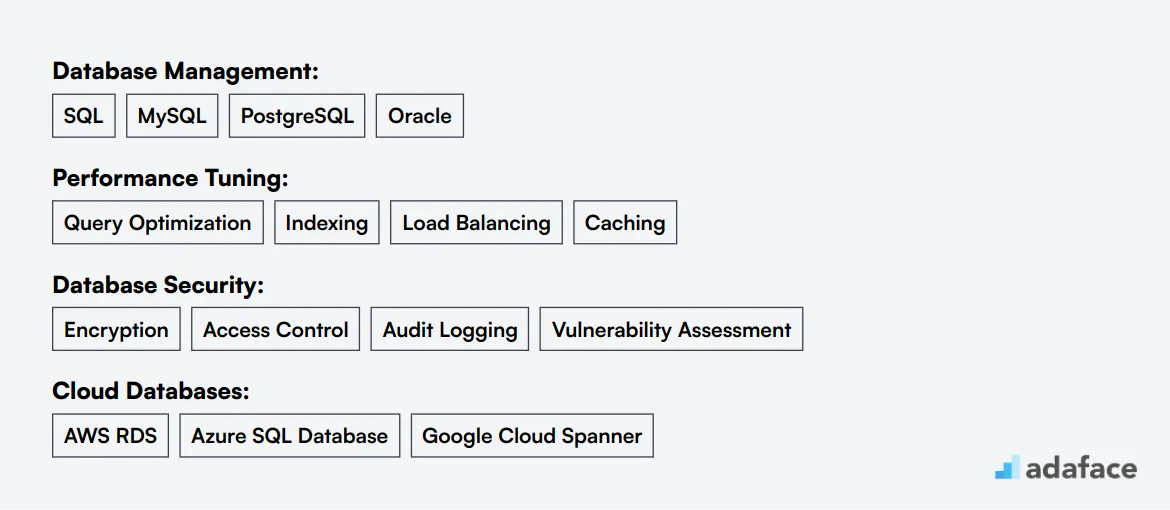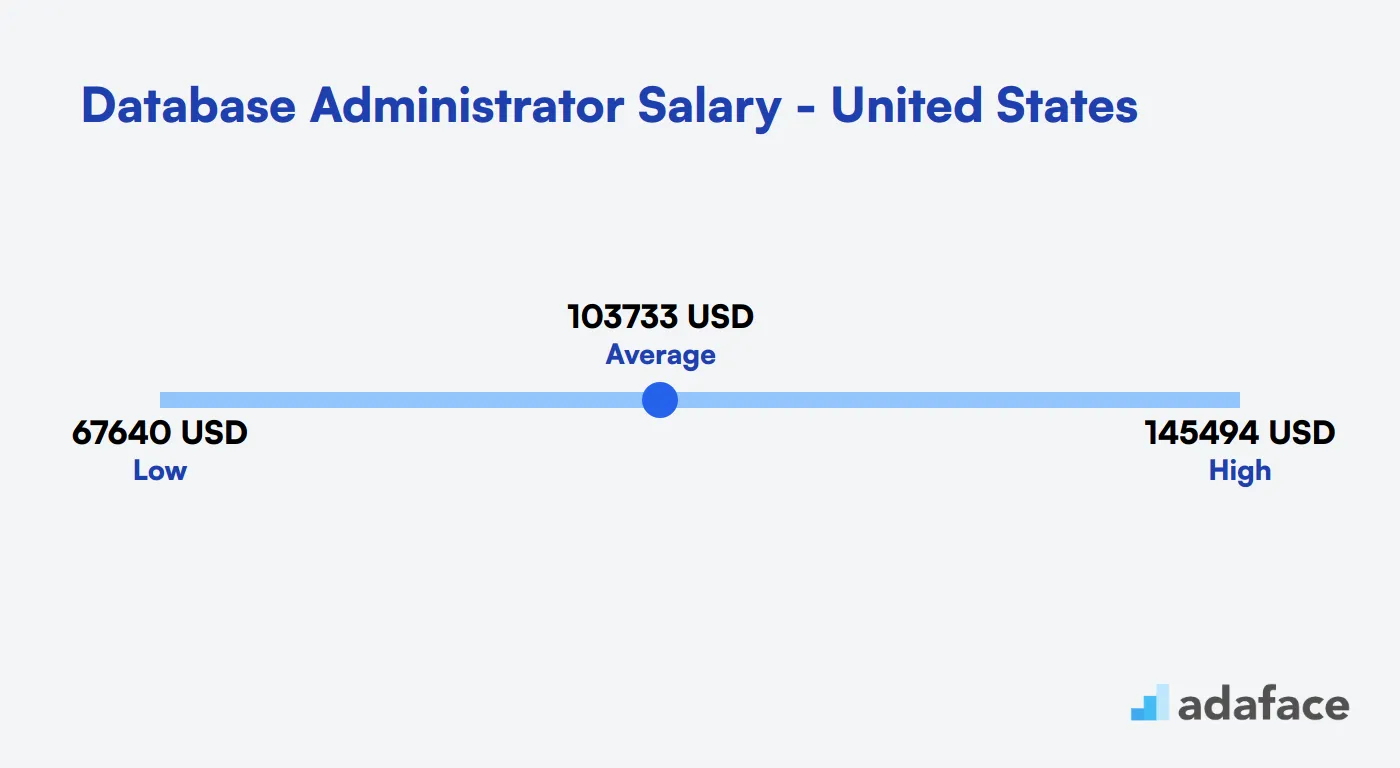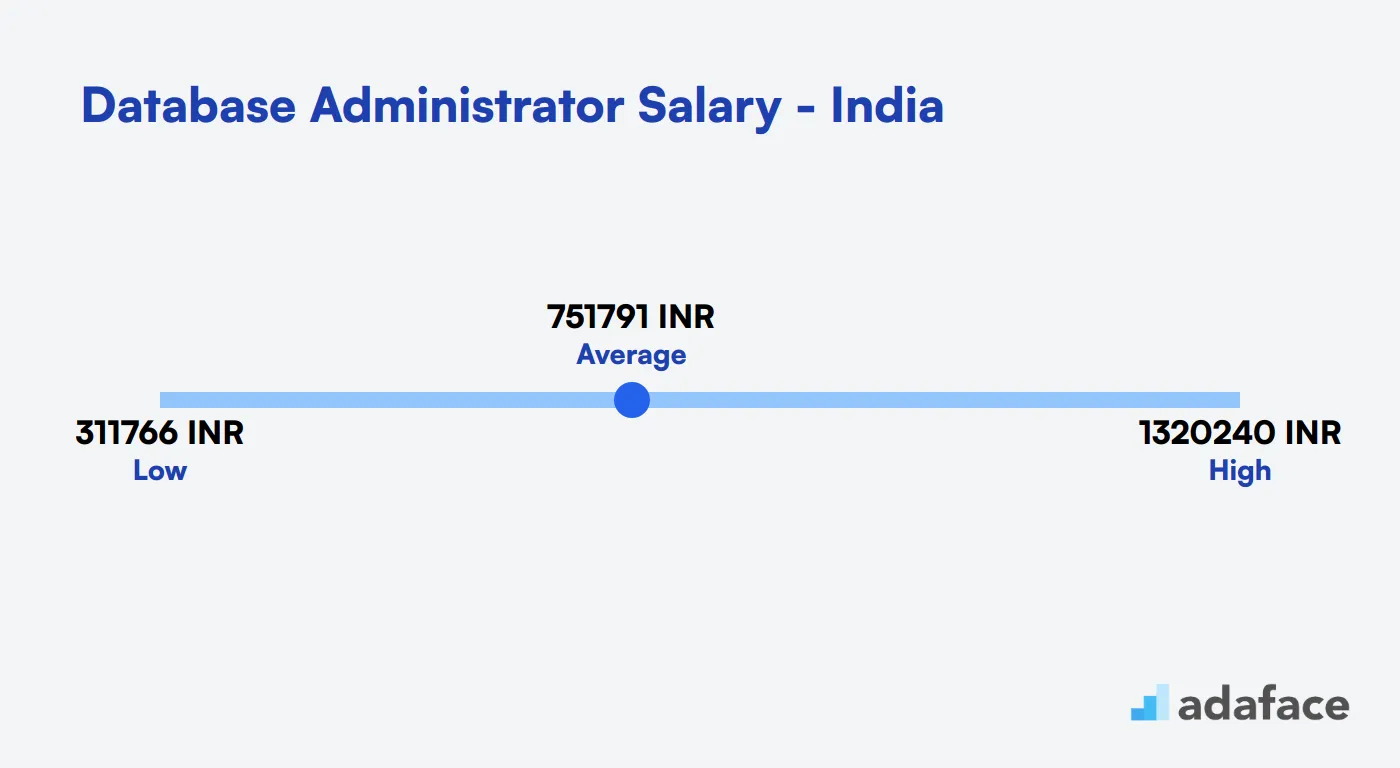Hiring a database administrator is a critical task for any organization relying on data management to drive operations, decisions, and strategy. A skilled DBA ensures that data is organized, secure, and accessible, making them a fundamental asset to IT teams. However, companies often struggle with identifying the right candidate due to the complexity and technical nuances involved in this role.
This article provides a comprehensive guide to hiring a database administrator, focusing on key skills and qualifications, writing effective job descriptions, platforms for recruitment, and how to screen resumes. Discover recommended skills tests, interview structuring, and more to ensure you find the right fit for your team. For additional resources, visit our Database Administrator Interview Questions.
Table of contents
Key Skills and Qualifications for a Database Administrator
When hiring a Database Administrator, it's important to clearly define the skills and qualifications you require. One common mistake is conflating required skills with preferred ones, leading to confusion during the hiring process. A well-structured candidate profile will help you differentiate between essential and desirable qualifications.
To help guide your search, we've outlined the skills that are generally considered mandatory as well as those that can enhance a candidate's profile. This distinction is vital for attracting the right talent for your organization's needs.
| Required skills and qualifications | Preferred skills and qualifications |
|---|---|
| Bachelor's degree in Computer Science, Information Technology, or related field | Experience with cloud-based database solutions (e.g., AWS, Azure, Google Cloud) |
| Three or more years of experience as a Database Administrator | Familiarity with database security best practices |
| Proficiency in SQL and database management | Experience with NoSQL databases such as MongoDB or Cassandra |
| Experience with database performance tuning and optimization | Certification in database administration (e.g., Oracle, Microsoft SQL Server) |
| Strong problem-solving and analytical skills | Proven success in a collaborative, team-oriented environment |
How to write a Database Administrator job description?
Crafting an effective Database Administrator (DBA) job description is key to attracting the right talent. Once you have a candidate profile ready, the next step is to capture that information in the JD to attract qualified candidates.
- Emphasize key responsibilities and impact: Clearly outline the role's responsibilities and how a DBA's work supports your organization. Highlight tasks like database tuning, security, and availability to draw candidates interested in making a real impact.
- Balance technical skills with certifications and soft skills: List necessary technical skills, such as proficiency in database management systems like SQL or Oracle, and relevant certifications like Oracle DBA Certification. Don't forget to include soft skills like problem-solving and teamwork, which are crucial for a DBA's success.
- Showcase the unique aspects of your company and role: Highlight what makes your organization and this position appealing. Whether it's innovative projects, growth opportunities, or a supportive team culture, these details can attract top-notch candidates. You can refer to the Database Administrator job description for more specific details.
Top Platforms to Hire Database Administrators
Now that you have a well-crafted job description, it's time to post it on job listing sites to attract qualified Database Administrator candidates. The right platform can significantly impact the quality and quantity of applicants you receive. Let's explore some of the best options for finding your next Database Administrator.
LinkedIn Jobs
Ideal for posting full-time Database Administrator positions. Offers wide reach and allows detailed job descriptions with company profiles.

Indeed
Versatile platform suitable for posting various types of Database Administrator roles. Offers a large candidate pool and easy application process.

Dice
Specialized in tech jobs, perfect for reaching experienced Database Administrators. Allows detailed technical requirements in job postings.

Beyond these popular choices, there are several other platforms worth considering. Stack Overflow Jobs is great for reaching active members of the developer community, while FlexJobs caters to those seeking remote or flexible work arrangements. Remember, the key is to choose platforms that align with your specific needs and the type of Database Administrator you're looking to hire. Combining multiple platforms can help you cast a wider net in your search for top talent.
How to Screen Database Administrator Resumes?
Screening resumes is a key step in the hiring process, helping recruiters quickly narrow down the pool of applicants. Given the complexity and critical nature of a Database Administrator's role, it's important to identify candidates with the right mix of skills and experience.

When manually screening resumes, focus on identifying specific keywords that align with your role requirements. For a Database Administrator, keywords include "SQL," "database management," and "performance tuning." Highlight resumes that mention these primary keywords to ensure candidates meet the foundational skills needed for the position. Manually checking these can streamline the initial screening phase.
Consider using AI tools like LLMs to enhance your screening process. By inputting the desired keywords, these tools can help you quickly sort through resumes, saving valuable time. AI can filter candidates based on keyword matches, providing a more efficient approach to initial screenings.
Here's a prompt you can use with AI tools:
TASK: Screen resumes for the Database Administrator role
INPUT: Resumes
OUTPUT: For each resume, provide the following information:
- Email id
- Name
- Matching keywords
- Score (out of 10 based on keywords matched)
- Recommendation (should we shortlist this candidate or not)
- Shortlist (Yes, No, or Maybe)
KEYWORDS DATA:
- Database Management (SQL, MySQL, PostgreSQL, Oracle)
- Performance Tuning (Query Optimization, Indexing)
- Database Security (Encryption, Access Control)
If you're interested in learning more, you can explore our skills assessment tools and technical screening posts.
Recommended Skills Tests to Screen Database Administrators
When hiring a Database Administrator, it's key to ensure they possess the specific skills required for the role. Skills tests provide an objective way to assess candidates' capabilities beyond their resumes. Here are our top recommendations for evaluating Database Administrators:
SQL Online Test: Evaluate candidates' understanding of SQL, which is fundamental for managing and querying databases. This test is designed to assess their ability to work with data effectively using SQL commands.
Oracle PL/SQL Online Test: Many enterprises rely on Oracle databases, making it essential to ensure candidates can handle PL/SQL programming. This test helps identify those who can write complex queries and scripts.
PostgreSQL Test: As a popular open-source database, PostgreSQL is frequently used in various applications. This test assesses candidates' proficiency in managing PostgreSQL databases, ensuring they can handle tasks such as creating and maintaining database objects.
MySQL Online Test: MySQL remains one of the most widely used databases. This test evaluates a candidate's ability to manage MySQL databases, including tasks like optimizing performance and ensuring data integrity.
MongoDB Online Test: For environments using NoSQL databases, such as MongoDB, it's critical to verify that candidates can manage and scale these databases efficiently. This test focuses on their skills with MongoDB operations and architecture.
How to structure the interview stage for hiring Database Administrators
Once candidates pass initial skills tests, it's important to progress to technical interviews to assess their hard skills. Skills tests are great for filtering out unfit candidates but not necessarily for identifying the best fit for the role. The interview stage helps in understanding the candidate’s practical knowledge and problem-solving abilities in real-world scenarios.
Consider asking candidates questions that gauge their technical depth and experience in database administration. Here are some examples:
- What strategies do you use for database backup and recovery? This question helps assess a candidate's understanding of risk management.
- How do you handle database security challenges? Evaluates their knowledge in safeguarding sensitive information.
- Describe your experience with performance tuning in PostgreSQL or other databases. This tests their skill in optimizing database performance.
- Explain the steps you take when performing data migration. Understanding their approach to data migration shows proficiency in handling complex tasks.
- How do you troubleshoot common database errors? This reveals their problem-solving abilities and technical expertise.
How much does it cost to hire a Database Administrator?
The cost of hiring a Database Administrator (DBA) varies based on location, experience, and industry. In the United States, DBA salaries typically range from $67,640 to $145,495, with a median of $99,204. Top-paying cities like Washington, DC, and Seattle, WA offer even higher salaries, reaching up to $164,612.
Globally, the figures differ. For example, in India, the average annual salary for a DBA is around ₹751,792, with a range from ₹311,766 to ₹1,320,241. These numbers can help recruiters set competitive offers and understand the market rates for Database Administrators.
Database Administrator Salary in the United States
The average salary for Database Administrators in the United States ranges from $67,640 to $145,495, with a median of $99,204. Top-paying cities include Washington, DC, and Seattle, WA, where DBAs can earn up to $164,612 and $144,484 respectively.
Salaries vary based on location, experience, and industry. For example, DBAs in Los Angeles, CA might earn between $42,928 and $97,431, while those in Chicago, IL can expect $78,944 to $129,726. These figures can help recruiters set competitive offers and candidates gauge their market value.

Database Administrator Salary in India
In India, the salary for a Database Administrator (DBA) can vary widely depending on the location. On average, a DBA can expect to earn around ₹751,792 annually. However, this can range from as low as ₹311,766 to as high as ₹1,320,241. For instance, in Gurgaon, the median salary reaches ₹1,156,797, reflecting higher compensation in tech hubs, while locations like Kochi offer median salaries around ₹502,105.

What's the difference between a Database Administrator and a Database Developer?
People often mix up the roles of a Database Administrator and a Database Developer as both work closely with databases. However, their responsibilities and focus areas differ significantly, serving distinct purposes in the database world.
A Database Administrator (DBA) primarily focuses on managing and maintaining database environments. Their key responsibilities include ensuring database performance, security, and backup. DBAs frequently work with tools like Oracle and MySQL to monitor and troubleshoot performance issues. They typically have backgrounds in computer science or information systems, often holding database administration certifications.
In contrast, a Database Developer concentrates on the design and creation of databases. Their main tasks include designing database structures, writing complex queries using SQL and PL/SQL, and utilizing development tools to optimize database design. Database Developers usually come from a software engineering or computer science background, often possessing development-focused certifications.
For more information on skills required for a Database Administrator, you can explore this resource.
| Database Administrator | Database Developer | |
|---|---|---|
| Primary Focus | Database Management | Database Creation |
| Main Responsibilities | Ensure Database Performance, Security | Design and Develop Databases |
| Key Skills | SQL, Backup, Security | SQL, PL/SQL, Development |
| Technical Tools | Oracle, MySQL, Monitoring Tools | Oracle, MySQL, Development Tools |
| Educational Background | Computer Science, Information Systems | Software Engineering, Computer Science |
| Experience Level | Operations, Maintenance | Development, Engineering |
| Certification | Database Administration Certifications | Database Development Certifications |
| Problem Solving Focus | Database Performance Issues | Optimizing Database Design |
What are the ranks of Database Administrators?
Database Administrator (DBA) roles often vary across organizations, making it challenging to define a universal ranking system. However, there are generally recognized levels of progression within the field.
Junior DBA: This entry-level position is for those new to database administration. Junior DBAs typically handle basic maintenance tasks, backups, and assist senior team members.
Database Administrator: The standard DBA role involves managing databases, optimizing performance, and ensuring data security. They often specialize in specific database systems like MySQL or PostgreSQL.
Senior DBA: With several years of experience, Senior DBAs take on more complex projects, mentor junior staff, and often lead database-related initiatives within their organization.
Principal DBA: This high-level position involves strategic planning, architecture design, and overseeing large-scale database operations. Principal DBAs often work closely with other IT leaders to align database strategies with business goals.
Database Architect: While not always considered part of the DBA track, Database Architects design and plan database systems at an enterprise level. They work closely with DBAs but focus more on overall data strategy and infrastructure.
Hire the Right Database Administrators for Your Team
In this guide, we've covered the key skills, qualifications, and interview strategies for hiring Database Administrators. We've also discussed job descriptions, resume screening, and the costs associated with hiring these professionals.
The most important takeaway is to use well-crafted job descriptions and skill tests to make your hiring process more accurate. By incorporating these elements, you'll be better equipped to find the Database Administrator who fits your organization's needs and contributes to your data management success.
SQL Online Test
FAQs
A database administrator should have strong technical skills in database management systems, SQL, data modeling, and backup/recovery. Soft skills like problem-solving and communication are also important.
To write an effective job description, clearly outline the responsibilities, required skills, and qualifications. Include details about the company's tech stack and any specific database technologies used. For a template, check our Database Administrator Job Description.
You can find qualified database administrators on platforms like LinkedIn, Indeed, and specialized IT job boards. Networking events and professional groups can also be helpful.
Common interview questions often focus on technical skills, including SQL queries, data modeling, and database security. For a detailed list, refer to our Database Administrator Interview Questions.
Evaluate technical skills through practical tests and assessments. Consider using online platforms that offer SQL, Oracle, or NoSQL tests. Explore our SQL Online Test for more resources.
A database administrator is responsible for managing, maintaining, and securing databases, while a database developer focuses on designing and building databases. Both roles require different skill sets and responsibilities.
Start with a phone screen to assess basic qualifications, followed by technical interviews and practical assessments. Finally, conduct a behavioural interview to evaluate cultural fit and soft skills.

40 min skill tests.
No trick questions.
Accurate shortlisting.
We make it easy for you to find the best candidates in your pipeline with a 40 min skills test.
Try for freeRelated posts
Free resources



